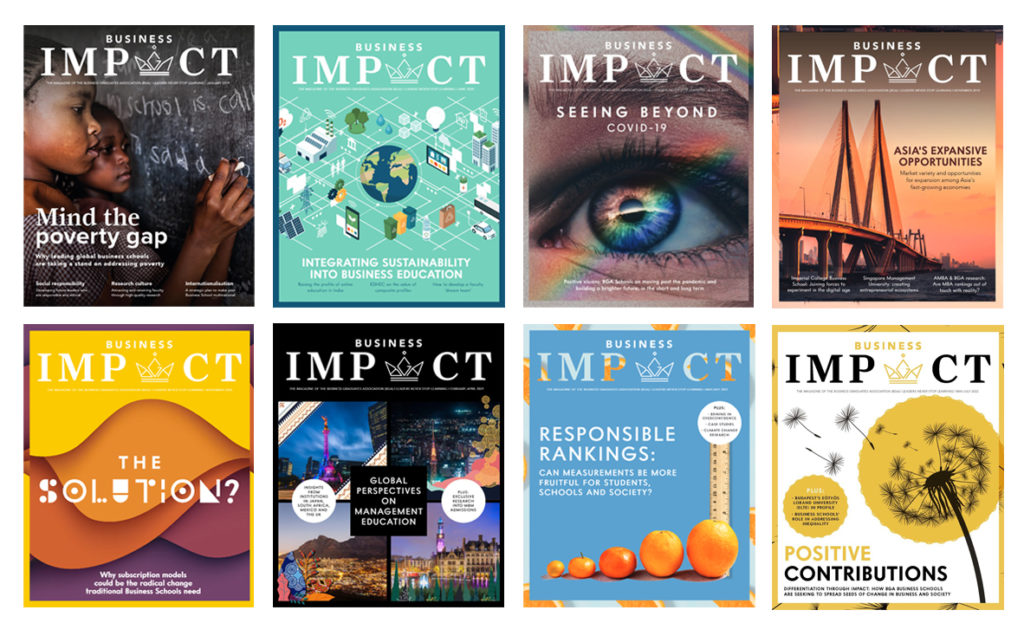
Going all-in with AI to enable impact
Discover six ways in which you can start using generative AI now to boost the impact of your business’ marketing activities
Welcome to Business Impact for Business Schools, your access point to the latest Business Impact magazine and a hub of valuable articles in business and business education.
You can easily download the newest edition of the magazine for free. We release a new edition every three months, so remember to check for updates.
Additionally, we provide online articles covering various key topics like business school strategies, course design, corporate social responsibility, and more.


Our thought leadership comes from working with business schools globally through the AMBA & BGA Network. We collaborate to explore a range of views on management education, including insights from deans, directors, and faculty members from business schools, as well as thought leaders from the business world.
Is your business school part of our network? If so, your students can benefit from free student membership, which grants them access to our Career Development Centre (CDC). In the CDC, they can find resources and exclusive articles designed to meet their specific needs. To access these, simply register or log in to your account.

Discover six ways in which you can start using generative AI now to boost the impact of your business’ marketing activities

Social development specialist Ildiko Almasi Simsic traces the emergence of a new type of capitalism and offers four tips on how you can apply it in your daily operations at work

From accelerating processes and catalysing change to uncovering potential treasure, AI can spur any organisation’s innovation cycle, says director of education at the Institute of Analytics Clare Walsh

Convincing displays of a start-up’s prospects are a crucial precondition for acquiring resources and generating wealth, says University of Pennsylvania assistant professor Benjamin Shestakofsky. Find out how founders can help build investors’ confidence

New research reveals that 57 per cent of students worldwide now expect their university to offer AI support tools. Managing director at Studiosity Isabelle Bristow delves deeper into the findings

The shift to renewable energy is the way the wind is blowing and business leaders must respond to these shifts, says Ruggero Gramatica from the University of Oxford’s Institute for New Economic Thinking

John Molson School of Business graduate Raffi Schieir offers an insight into the life of a social entrepreneur and how his start-up shows that doing the right thing and making a profit are not mutually exclusive

Looking within can help female leaders transform behaviours that hinder their authenticity, self-belief and ability to thrive, says the author of Lead Like You, Jo Wagstaff

If you aren’t a leader characterised by energy and dynamism, the general consensus is your story isn’t worth telling. Martin Gutmann explains why we need to widen the net of those profiled in case studies at business schools

Luxury goods may not appear to be a perfect match for sustainable development, but the industry is poised to set new ecologically responsible trends, say Audencia Business School’s Michaela Merk and social impact consultant Anne-Sophie Bordry

Customer experience is broadening the marketing function’s scope. The Kellogg School’s Philip Kotler explains the value of competing in this arena, together with his co-authors of Marketing 6.0, drawing on lessons from Coca-Cola

A look at how Grenoble Ecole de Management aims to support students who are also caregivers. By Tim Banerjee Dhoul

President of the Positive Impact Rating Katrin Muff outlines the value of a system that works with students to assess a business school’s impact orientation and offers insights into areas of strength and potential improvement

Organisations can effectively ‘game’ their CO2e results by using the dataset that gives them the most suitable results, according to research from King’s Business School. Ellen Buchan reports

Insights into key terms and processes involved when working with data science teams are revealed using an accessible narrative in this excerpt from Winning with Data Science
If you are a current business school member of the BGA network and wish to showcase your school in the upcoming issue of Business Impact magazine, please reach using the contact information provided below.

If you represent a business school that is not currently a member and would like to explore the marketing and PR support services available through BGA membership, you can find additional information about BGA membership here or contacting us using the contact details below.

If you are an organisation interested in advertising with BGA, please visit our commercial opportunities page here, or you can get in touch with us using the contact information below.

